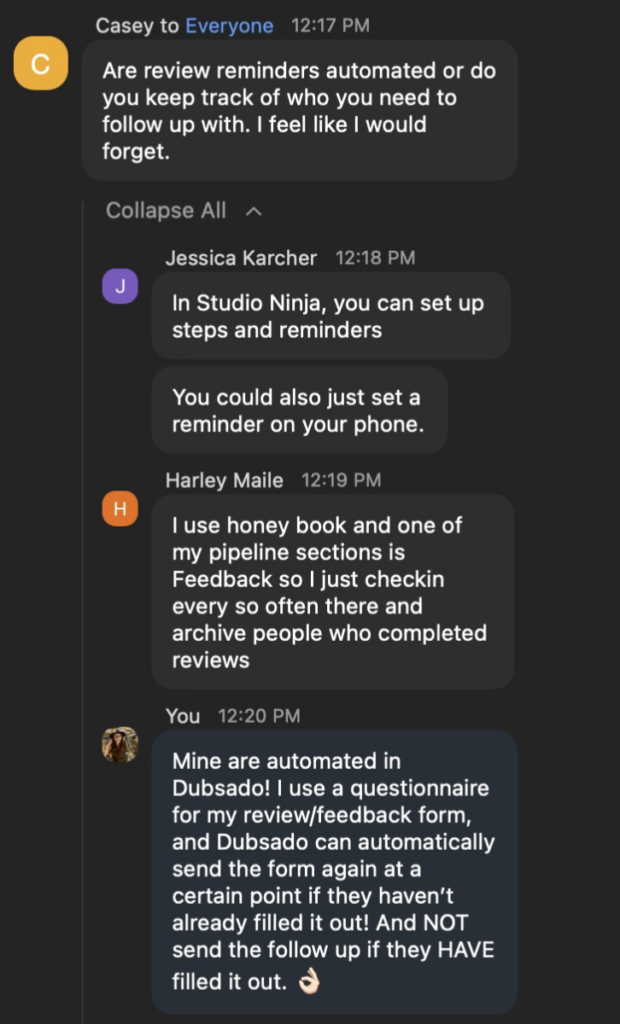How’s your review workflow in your business? Have you taken its pulse lately? Do you have a process to collect reviews at all?
There are so many entrepreneurs who don’t have a system to collect or track reviews, and this is a huge missed opportunity! Reviews are the lifeblood of business owners and entrepreneurs. They are the social proof we all need to show to potential clients and customers to demonstrate that we’re worth trusting and hiring to solve their problem. But how can you get those reviews if you don’t ask?
Maybe you’ve taken the first step in this process and drafted a canned email for your past clients to make this request; maybe you’ve built a form for them to fill out. (great job for being on the right track!) But maybe you don’t have the time to send those pieces of content and it gets dropped to the bottom of your to-do list, or maybe you loathe following up with those clients – so you don’t. This is also a huge missed opportunity, but don’t worry: I’m going to help teach you how to streamline this process.
It’s time to learn how to automate your Dubsado review process!

How to Automate your Dubsado Review Process, Step #1: CREATING A NATIVE DUBSADO FORM
The first thing I recommend to entrepreneurs using Dubsado is to create a native form for a client to fill out; this is the foundation for the automated system you’ll be able to make. Many people simply link their Google and Facebook business pages in their emails to clients with some instructions about what to write. But doing it this way means that the onus is on you to remember to follow up and check in on whether or not they’ve submitted a review.
Benefit #1
At a minimum (even without automating it), I recommend sending clients a Dubsado questionnaire to write their review. But don’t worry, you can still incorporate your Google and Facebook pages! I like to link these at the bottom of the questionnaire, and instruct my clients to simply copy/paste the review they wrote within my Dubsado form to those platforms.
By starting with a native form, once you get farther into the automation process, you’ll be able to dictate a workflow to send out reminders to the client if they haven’t filled out the form in a particular period of time. This isn’t possible with outside third party platforms, because Dubsado can’t “watch” for things to be submitted there. It can only see what’s being completed that’s sent within the native workflow.
Benefit #2
The other benefit to doing it this way is that you will always have a record of what the client wrote to you. I’ve heard so many horror stories of business owners having their Google reviews disappear into thin air and not being able to recover them. It’s the same concept of cultivating an email list in addition to social media because you don’t own your social channels.
Those could disappear or change in an instant, and you wouldn’t be able to control it. By keeping your clients’ reviews attached to a form on their project, you’ll always be able to easily find it and reference it when you want to add their comments to any of your marketing materials.
So! Now you have a native questionnaire built to collect reviews. What’s next when it comes to leveling up your review process?
How to Automate your Dubsado Review Process, Step #2: Teaching Dubsado to Handle Your Follow Ups
This is where the magic of Dubsado comes in. In Honeybook, I’ve heard entrepreneurs say they keep a “feedback” status in their pipeline, and simply check in there periodically to see whether clients have completed their form (and follow up if not); simply because there’s nothing else that can be automated around this on that platform. If you ask me – oof, what a waste of time. Dubsado can do this automatically for you!

Common Objection #1
In Dubsado, you can set up reminders to the client to fill out the questionnaire, which are completely automated. One concern I hear a lot from people is: “I don’t want clients getting reminders if they’ve already filled out the form.” Or, “I don’t want reminders going out before they’ve had enough time to complete it.” These are valid concerns, and ones we can address in Dubsado!
The answer to the first objection is the workflow trigger “after form is not completed.” This is my absolute favorite trigger. When you have this set up in a workflow with a form, you can dictate the workflow to “watch” for whether a form is completed or not. And if not, to send a reminder for you.
Common Objection #2
The answer to the second objection dovetails nicely with the first one. In the same workflow action with the above trigger, you’ll also specify how long you want the workflow to wait before it checks to see if that form is completed. If you want to avoid pestering your clients twice a week until they fill it out, space your reminder out a while. Maybe you send it two weeks after sending the form in the first place, or maybe a month.
Set the timing to be whatever feels good to you! But whatever you do, DON’T skip it. Reminders are pure gold. People are busy these days and have a lot going on; if you served the client well and they don’t respond to your first review ask, it’s probably for good reason! You are not being annoying by following up and asking again. In fact, you’re doing them a favor by bringing it back to the top of their inbox because they probably want to write a review to sing your praises!
How to Automate your Dubsado Review Process, Step #3: Additional Automation Options
If you want to take this even farther, you can incorporate project status changes to this workflow sequence, like “waiting for review” (after sending the form the first time) and “review follow up” (after sending a reminder). To accomplish this, you would set the project status change to trigger “after all previous actions complete” and place the action after each subsequent form sending action. You could also incorporate a form submission email that goes out to the client once they click submit on the questionnaire, thanking them for doing so!

How to Automate your Dubsado Review Process, Step #4: TYING IT ALL TOGETHER
Want to see this all in action? Here’s an example workflow tying everything together that I’ve talked about in this post:
- “Send form” (questionnaire with corresponding canned email attached) 1 hour after workflow starts
- “Change project status” to ‘waiting for review’ after all previous actions completed
- “Send form” (questionnaire with corresponding reminder email #1) 14 days after form is not complete
- “Change project status” to ‘review follow up’ 14 days after form is not complete
- “Send form” (questionnaire with corresponding reminder email #2) 20 days after form is not complete
- [**NOTE: due to one of Dubsado’s idiosyncrasies, this action will happen 20 days after the last time the form was sent (reminder #1). This means that reminder #2 will go out 34 days after the step #1]
- “Change project status” to ‘review completed’ immediately after form is completed
A Key Thing to Note
In order to fully automate this process, you need to make sure you’re sending the review form within the workflow. Dubsado’s workflows can’t “watch” for things to happen (like a form being completed, or an appointment being scheduled, etc.) when they aren’t sent within a workflow. This means that if you manually send your review form to a client, and then apply a workflow with an action set to send the questionnaire again “after form is not completed”, it won’t work because the form was not originally sent from within the workflow the first time around. Your first step in the workflow sequence always needs to include the piece of content you want the workflow to reference later (in this case, the review questionnaire).
A Word on Perfectionism
Don’t worry about waiting until your entire top-to-bottom workflow is finished to incorporate these action items. This would be perfect for what I call a “sidekick” workflow, with these items in a standalone workflow sequence – then you can immediately put this into practice for your existing projects, and simply add it to whichever ones it’s applicable to. It’s all about the small moves, working toward your end goal of full automation.
There you have it: my best tried and true practices for automating your Dubsado review process! If you’ve let your review ask process drop off your priority list, I hope this inspires you to pick it back up. Client testimonials are quite literally priceless; their words can be used in so many places in your marketing materials and often carry 10x as much weight as your own words, in the eyes of a potential customer viewing them. Now get out there and automate the ask!
View comments
+ Leave a comment